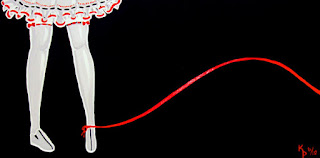FAREWELL BAD BUSH.
Arabs hail shoe attack as Bush's farewell gift
BAGHDAD (AFP) - - Iraq faced mounting calls on Monday to release the journalist who hurled his shoes at George W. Bush, an action branded shameful by the government but hailed in the Arab world as an ideal parting gift to the unpopular US president.
"Throwing the shoes at Bush was the best goodbye kiss ever... it expresses how Iraqis and other Arabs hate Bush," wrote Musa Barhoumeh, editor of Jordan's independent Al-Gahd newspaper.
Hundreds of Iraqis joined anti-US demonstrations to protest at Bush's farewell visit on Sunday to Iraq, which was plunged into a deadly insurgency and near civil war in the aftermath of the 2003 invasion.
The Iraqi government branded Zaidi's actions as "shameful" and demanded an apology from his Cairo-based employer, which in turn called for his immediate release from custody.
Zaidi jumped up as Bush was holding a press conference with Iraqi Prime Minister Nuri al-Maliki on Sunday, shouted "It is the farewell kiss, you dog" and threw two shoes at the US leader.
The shoes missed after Bush ducked and Zaidi was wrestled to the ground by security guards. He is currently being held by the Iraqi authorities, a source in Maliki's office said without elaborating.
Al-Baghdadia issued a statement demanding Zaidi's release "in line with the democracy and freedom of expression that the American authorities promised the Iraqi people."
"Any measures against Muntazer will be considered the acts of a dictatorial regime," it added.
But the government called for the channel to apologise, saying: "This action harms the reputation of Iraqi journalists and journalism in general."
Saddam Hussein's former lawyer Khalil al-Dulaimi said he was forming a team to defend Zaidi and that around 200 lawyers, including Americans, had offered their services for free.
"It was the least thing for an Iraqi to do to Bush, the tyrant criminal who has killed two million people in Iraq and Afghanistan," said Dulaimi.
"Our defence of Zaidi will be based on the fact that the United States is occupying Iraq, and resistance is legitimate by all means, including shoes."
Zaidi's colleagues in Baghdad, where he had worked for three years, said he had long been planning to throw shoes at Bush if ever he got the chance.
"Muntazer detested America. He detested the US soldiers, he detested Bush," said one on condition of anonymity.
Soles of shoes are considered the ultimate insult in Arab culture. After Saddam's statue was toppled in Baghdad in April 2003, many onlookers pelted it with their shoes.
But young Iraqi woman Oum Mina said she didn't consider Zaidi a hero.
"Bush is our enemy. But when you invite your enemy into your home, you don't treat him this way. This could destroy the image of Iraqis."
Protestors in Sadr City, the bastion of radical anti-US cleric Moqtada al-Sadr, however, threw shoes at passing US military vehicles, while in the holy Shiite city of Najaf, the crowds chanted "Down with America."
"All US soldiers who have used their shoes to humiliate Iraqis should be brought to justice, along with their US superiors, including Bush," said Ali Qeisi, head of a Jordan-based Iraqi rights group.
"The flying shoe speaks more for Arab public opinion than all the despots/puppets that Bush meets with during his travels in the Middle East," said Asad Abu Khalil, a popular Lebanese-American blogger and professor at Stanislaus University in California at angryarab.blogspot.com
An Iraqi lawyer said Zaidi risked a miminum of two years in prison if he is prosecuted for insulting a visiting head of state, but could face a 15-year term if he is charged with attempted murder.
"We fear for his safety," said Muzhir al-Khafaji, programming director for the television channel, adding that Zaidi had been arrested before by the Americans and that there were fears that more of its 200 correspondents in Iraq would be detained.
But in Libya, a charity headed by Moamer Kadhafi's daugher Aisha announced it was going to award Zaidi an "order of courage" for his actions.

Comments